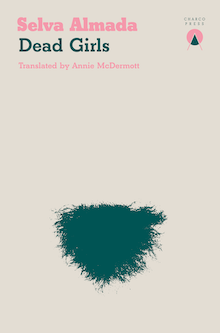Five Questions with Annie McDermott about “Dead Girls”
To mark the release of Dead Girls by Selva Almada (Charco Press), we asked translator Annie McDermott a few questions. Enjoy!

How did you come to Dead Girls?
Annie McDermott: In fact, Dead Girls came to me. Chris Andrews, who translated—brilliantly—Selva’s first novel, The Wind that Lays Waste, was too busy to take it on, so Carolina from Charco Press asked me to do it. She gave me a copy of the original after we met up in London one evening, and I remember reading the opening pages on the tube on my way home, among the discarded McDonald’s packaging and dozing office-workers, and getting shivers down my spine because it was so extraordinary.
Why should people read this book?
AM: Because it puts gender violence under the microscope and shows you what it’s made of—all the ugly component parts, wriggling around on the slide in full view. Nothing in this book is abstract: it’s all real, it’s all there on display, which is what makes reading it such a visceral and unforgettable experience.
What did you learn in the process of translating this book?
AM: In a way, I felt like I was translating for the very first time when I began work on Dead Girls. The stakes seemed so high—these were real women, real stories, real lives and deaths. Because of that, the accuracy of the translation seemed more crucial than ever, and my early drafts were quite wooden because I was clinging so tightly to the original. But as I carried on working, I learnt all over again that translating involves being faithful to so many things at once, like the rhythm and tone and emotional weight of each sentence, and that to achieve this you sometimes have to loosen your grip on the original.
What specific elements of style/structure/voice were the most challenging/rewarding about this project?
AM: The sparseness of the prose was a great challenge and, by the end, a great thrill—learning from Selva how much you can do with very few words, as long as they’re the right ones and in the right places.
If someone loved Dead Girls, what would you recommend they read next?
AM: I edited this book, so I’m biased, but I’d say this even if I hadn’t: Slash and Burn, by the Salvadoran writer Claudia Hernández, translated by the inimitable Julia Sanches and published last month by And Other Stories. Set in an unnamed Central American country, it tells the story of several generations of women struggling to get on with their lives in the wake of a civil war. Like Dead Girls, it goes beyond the headlines and statistics to explore everyday reality for individual women in a corrupt, patriarchal and unequal society. Both books are preoccupied with historical memory and seem to be presenting themselves as a kind of alternative account, with a different focus and on a different scale, and telling a different kind of truth.

Leave a Reply